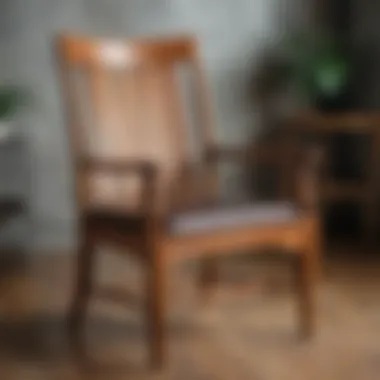Hub Furniture in Portland: A Unique Design Perspective


Intro
Portland, Maine is a city that buzzes with creativity and a strong sense of community. It’s not just about picturesque lighthouses and seafood; there's a vibrant scene when it comes to furniture design that reflects the essence of this charming coastal town. This article takes you on a journey into the world of hub furniture in Portland, exploring the unique blend of artistry, sustainability, and local influences that define the market.
From the local craftsmen who pour their heart into each piece to the emerging trends that resonate with eco-conscious consumers, we’ll dive into the fascinating dynamics at play. Here’s a first look at some of the key areas we’ll examine:
- The design trends that are shaping Portland's furniture scene.
- Essential buying guides for homeowners, designers, and DIY enthusiasts.
- Unique features of hub furniture and how the local culture plays a vital role.
By the end, readers will gain valuable insights into how to enhance their living spaces with pieces that not only serve a purpose but also embody the spirit of Portland.
Prologue to Hub Furniture
In recent years, the concept of hub furniture in Portland, Maine has captured the attention of residents and visitors alike. This growing phenomenon represents more than just a trend; it is a reflection of the city's unique characteristics and cultural fabric. Understanding hub furniture means diving into a realm where artistry meets functionality, bringing together local artisans, sustainable practices, and evolving consumer preferences.
Exploring this topic is essential not just for homeowners looking to enhance their living spaces, but also for designers and DIY enthusiasts who wish to tap into emerging styles and materials. The significance of hub furniture lies in its ability to showcase local craftsmanship and creativity, fostering a sense of community while meeting practical needs in a rapidly changing market.
The diverse offerings in Portland have reshaped the furniture landscape, driven by an increasing demand for unique and sustainable pieces. In this section, we explore what hub furniture entails and how Portland has emerged as a pivotal player in this growing scene.
Defining Hub Furniture
When we talk about hub furniture, we aren’t just referring to pieces of wood or fabric arranged in a room; it's a concept that embodies local culture, community values, and sustainable living. Hub furniture denotes items designed and manufactured in Portland, often by local artisans, that highlight Maine's rich traditions mingled with contemporary style.
Key points to consider when defining hub furniture:
- Local Craftsmanship: Furniture pieces are often handcrafted, giving them a unique touch that mass-produced items cannot replicate.
- Sustainable Materials: Many artisans prioritize eco-friendly materials, aligning with the growing need for green living.
- Cultural Resonance: Each piece often tells a story of Portland’s heritage, echoing the seaside aesthetics and the spirit of the community.
By focusing on these areas, hub furniture encapsulates the essence of Portland. It invites people to create their own spaces with character, one piece at a time.
The Rise of Portland as a Furniture Hub
Over the last decade, Portland has evolved into an unexpected epicenter for furniture design and innovation. The city's artistic community has flourished, spurred by a combination of factors that have made it an attractive place for both artisans and consumers.
Several elements contribute to this rise:
- Thriving Creative Scene: Portland is home to numerous artists and designers who draw inspiration from the city’s vibrant culture and natural surroundings.
- Community Support: Residents actively nurture local businesses, often choosing to support artisans rather than larger chains, helping sustain the growth of the hub furniture movement.
- Accessible Resources: With workshops, maker spaces, and events, Portland provides ample opportunities for collaboration among creators.
The political climate, too, has shifted toward supporting local craftsmanship, enhancing opportunities for growth within the furniture industry. Now, visitors to Portland can experience not only creative designs but also meaningful interactions with the makers themselves, reinforcing the bond between consumer, creator, and community.
Portland's rise as a prominent furniture hub is not simply about new designs; it’s about fostering local pride and sustainability within a city that values its past while eagerly creating its future.
Historical Context
Understanding the historical context of furniture design in Portland, Maine is crucial to grasping the rich tapestry that informs the present-day furniture culture in the city. The evolution of styles, materials, and local craftsmanship contributes significantly to how Portland positions itself as a distinctive hub in the realm of furniture design. It’s not merely about aesthetics; it’s about cultural identity, economic movements, and community engagement that has shaped the market over the years.
Evolution of Furniture Design in Maine
Maine's furniture design history roots back to colonial times, shaped by its geographical location and the resources that the land provided. Early settlers used local timber to craft simple furniture that was often utilitarian, reflecting the needs of the harsh New England climate. Wood from pine, cherry, and oak became the backbone of early furniture making, laying the foundation for contemporary artisans who continue this tradition.
Skipping ahead to the 19th century, there was a marked shift as industrialization made its way into Maine. Factories blossomed, and furniture styles began to embrace influences from different design movements, notably the Arts and Crafts movement which emphasized craftsmanship and natural materials. This period marked the rise of fine furniture craftsmanship in Portland, showcasing an appreciation for handwork and quality that resonates today. As you stroll through local shops, you can often spot pieces that echo this historic attention to detail, sustaining that legacy of artisanal ingenuity.
Today, you might find innovative designs that draw not only from Maine’s rich history but also from global trends, with local artisans weaving their personal stories into handcrafted items. The synergy of old skills and modern techniques is vital. Thus, one can appreciate that the furniture you see now is not a simple product; it encapsulates centuries of evolution.
Key Influences of Portland's Culture
Portland's unique culture is a melting pot of influences that shapes its furniture scene. The city’s demographics contribute significantly to the aesthetic and functional preferences in furniture design. Portland is home to a growing population of artists, designers, and young professionals, each impacting the local marketplace with their tastes and demands.
Moreover, Portland's coastal setting and vibrant arts scene encourage creativity and encourage designers to think outside the box. The local culture promotes a sense of community—this notion is evident in how furniture shops often feature pieces that resonate with the collective identity of the area.
Some influences include:
- Environmental Awareness: As a city that holds sustainability in high regard, many local furniture makers prioritize eco-friendly materials and practices. This focus not only satisfies a market demand but also reflects the values of Portland residents.
- Artistic Collaboration: The arts community in Portland often collaborates with furniture designers, leading to unique pieces that defy traditional classifications. This fusion of art and furniture continues to inspire both designers and consumers alike.
- Historical Attributes: As new shops open up, they often pay homage to Maine’s historic craftsmanship, integrating older styles with modern functionality. This blend keeps the history alive in a contemporary framework, which draws both locals and visitors alike.
"Maine's rich past is not a mere backdrop but an active participant in shaping the present. The furniture industry here is a testament to that ongoing dialogue between the old and the new."
As consumers become more discerning, they look for furniture that tells a story—one that showcases both the craft of the maker and the culture of the community. This blend of historical richness and cultural influence reinforces Portland's position as a key player in the hub furniture landscape.


Craftsmanship and Materials
In the realm of hub furniture, especially in a vibrant city like Portland, Maine, the spotlight frequently shines on the artistry behind the pieces. The craftsmanship and materials chosen don’t just define a furniture item; they encapsulate the identity of a community. Each piece tells a story, revealing insights into both the makers and the culture from which they arise.
Artisans in Portland are driven by a passion for quality and uniqueness. The dedication to handcrafted methods fosters an environment where furniture is not merely functional but also a statement of style and personality. Today’s consumers increasingly lean towards pieces that boast not just aesthetic appeal but also a strong narrative, sustainability, and a personal touch.
Local Artisans and Their Work
Portland, with its mosaic of creative minds, offers a goldmine of local artisans who are reshaping the furniture landscape. These craftsmen bring years of expertise and heartfelt passion, creating pieces that stand out in both functional and artistic dimensions. Whether it’s a finely carved table or a meticulously upholstered chair, the attention to detail can be staggering.
Many artisans source materials locally, believing in the integrity of using what the region provides. This practice not only supports local economies but also instills a sense of pride in their work. From the warm hues of Maine maple to the rugged beauty of reclaimed wood, the materials tell their own tales. The result is a furniture collection that is reflective of the landscape that surrounds Portland.
"In Portland, every piece crafted isn’t just about utility; it’s about creating connections between people and their environments."
Creators such as Dyer Furniture incorporate artistic cuts and finishes that transform ordinary materials into extraordinary statements. Portland Design Works pays homage to both form and function, blending traditional woodworking techniques with modern design aesthetics. The personal touch each craftsman imparts is what elevates their furniture from mere objects to treasured heirlooms.
Sustainable Materials in Furniture Making
An increasing awareness of environmental issues has grown in tandem with a preference for sustainable materials in the furniture sector. Portland is at the forefront of this trend, with many designers and manufacturers prioritizing eco-friendly options. Consumers today are savvy; they often ask about the origins of the materials used in their furniture.
Sustainable materials can range from responsibly harvested hardwoods to recycled metals. Furniture crafted from reclaimed or salvaged wood not only promotes sustainability but also adds a unique character to each piece. These materials carry their own histories, making them all the more appealing to buyers seeking something special.
Portland design sensibilities encourage a minimalist approach, which often favors natural finishes over synthetic ones. By choosing low-VOC finishes, local creators ensure that their work is as healthy for the indoor environment as it is for the planet.
In this context, materials are not just a choice—they're a message. Homeowners and designers alike are increasingly expressing their values through their selections, and this is particularly true in a forward-thinking city like Portland. As the furniture scene continues evolving, the emphasis on craftsmanship and sustainable practices only deepens, solidifying Portland's position as a forerunner in innovative design.
By choosing locally crafted, sustainable furniture, consumers not only enhance their spaces but also become part of an ongoing story. The importance of craftsmanship and materials in Portland's furniture scene is not merely about aesthetics but deeply rooted in community values and environmental awareness.
Design Trends
When it comes to understanding the furniture landscape in Portland, Maine, the topic of design trends is pivotal. Design trends breath life into spaces, enabling homeowners and designers alike to craft environments that reflect their unique taste and lifestyle. They serve not only aesthetic purposes but also influence how a home feels and functions. Trends evolve as society shifts; thus, it's crucial to pay attention to the direction in which local style is moving. Notably, Portland’s blend of innovation and tradition creates a fertile ground for diverse design approaches, allowing consumers to draw inspiration from various influences.
Contemporary vs. Traditional Styles
The debate between contemporary and traditional styles in furniture design in Portland fosters a vibrant discussion in the local community. Contemporary furniture often champions sleek lines, open spaces, and minimalistic aesthetics. Think of pieces that prioritize function while embodying a modern sensibility. This style appeals especially to younger homeowners who favor a clutter-free environment and seek out items that are both stylish and functional. For example, a modern sectional sofa may not only provide comfort but also double as a statement piece or focal point in a room.
On the flip side, traditional styles err towards ornate details and classic silhouettes. Familiarity plays a big role here, as many Portlanders lean into pieces with rich history and craftsmanship. Antique armoires, for instance, bring a sense of comfort and nostalgia that resonates deeply with a community that values its heritage. The choice between these styles isn't just about aesthetic preference; it encapsulates how individuals and families view their living spaces.
- The blend of both styles can lead to personalized spaces that tell a story.
- Mixing contemporary furniture with traditional accents can create a harmonious balance.
Designers in Portland have embraced this duality, encouraging residents to explore combinations of contemporary and traditional elements. Many local stores, such as GreenTree Home and Maine Design Works, offer curated selections that celebrate this intersection, allowing new homeowners to realize their design aspirations with ease.
The Impact of Minimalism
Minimalism, with its emphasis on simplicity and function, has taken Portland by storm. This design philosophy encourages individuals to pare down their possessions, inviting only those items that bring joy or serve a purpose. In a world that constantly bombards us with choices, adopting a minimalist approach can be both refreshing and liberating.
In the context of furniture design, minimalism means opting for clean lines, muted colors, and unembellished shapes. Zero clutter is the mantra here. A well-placed, understated coffee table, for instance, can beautifully anchor a room without overwhelming it. This kind of design not only enhances the visual appeal but also promotes a serene atmosphere, which many are seeking in today's frenetic world.
"The most important part of minimalism is that it invites an uncluttered mind, allowing space for personal growth and creativity."
A notable trend associated with minimalism is the rise of multifunctional furniture – pieces that serve more than one purpose, appealing to residents in branded spaces with limited square footage. For example, a sofa that converts into a bed or storage ottomans eliminating the need for excess storage solutions. Portland showcases myriad businesses that understand this shift, offering both ideal designs and educational workshops for those who want to dive deeper into minimalism.
Consumer Preferences
Understanding the preferences of consumers in Portland, Maine is crucial to appreciating the local hub furniture scene. When homeowners, designers, or DIY enthusiasts approach the furniture market, their choices are influenced by a myriad of factors. In essence, consumer preferences play a significant role in shaping the demand for unique designs, sustainable materials, and innovative craftsmanship.
What Portland Residents Look For
Portland residents often prioritize a blend of style, function, and sustainability when selecting furniture. The eclectic nature of the city influences its dwellers to seek out items that reflect their individual tastes while also fitting into their home aesthetics. Here are some key elements that characterize what Portlanders typically look for:
- Sustainability: Many consumers are keen on environmentally friendly options. They frequently seek out furniture made from reclaimed wood or sourced from sustainable materials, aligning with the city's progressive values.
- Local Craftsmanship: There is a strong appreciation for locally crafted pieces. Residents enjoy supporting artisans from the area, as this fosters a sense of community and often results in unique designs that tell a story.
- Versatility: Portlanders often live in smaller spaces, prompting a demand for furniture that is both stylish and functional. Items that offer multi-functional uses, such as storage ottomans or foldable tables, are especially popular.
- Aesthetic Appeal: The love for distinct, artistic designs is high. People are drawn to bold patterns, colors, and textures that can lend a sense of character to their homes.
This diverse set of desires drives furniture makers to innovate and adapt their offerings to meet the community's evolving tastes.
The Role of Price Versus Quality
When it comes to the balance between price and quality in the Portland furniture market, there’s a stubborn reality. Residents often find themselves navigating choices between affordability and durability. This tug-of-war can significantly affect their purchasing decisions.


- Quality Over Quantity: Many consumers in Portland revel in the idea that investing in quality items pays off in the long run. They are inclined to spend more on furniture they believe will last, rather than opting for cheaper alternatives that may need replacement sooner.
- Perceived Value: The connection between price and the material used is pivotal. For instance, a table made from reclaimed oak might come at a premium but offers a unique charm and durability that many are willing to pay for.
- Budget Consciousness: However, not everyone has an open wallet. Portland’s residents also contain a segment that is budget-conscious. These individuals often hunt for sales, second-hand options, or DIY projects to offset costs while still finding quality pieces.
Shopping Experiences
Navigating the furniture landscape in Portland, Maine, is a journey filled with intriguing touchpoints, offering someone a balance between local charm and modern conveniences. The importance of varied shopping experiences cannot be understated. They shape how consumers engage with the market, allowing homeowners, designers, and DIY enthusiasts alike to find exactly what resonates with their aesthetic and functional needs.
Local Showrooms and Boutiques
Local showrooms and boutiques are often the heart of Portland’s furniture scene. These spaces are more than just stores; they’re curated experiences that reflect the region's unique craftsmanship and style. Walking into a local boutique, you may find not only an array of stunning pieces but also a story behind each one. These shops often exhibit furniture that’s designed by local artisans, infusing personality into any living space.
The distinctiveness of these showrooms lies in their commitment to quality and community. When you purchase from a local source, you are supporting the artistry and labor of your neighbors. Additionally, you might stumble upon handcrafted works that aren’t available elsewhere, making your purchase genuinely one-of-a-kind.
In these showrooms:
- Personalized Consultation: Assistants often provide tailored advice, helping shoppers find the perfect fit for their homes.
- Unique Inventory: Many boutiques offer exclusive pieces that showcase Portland's creative talent.
- Local Artistry: Meet the makers and hear their stories, deepening your connection to the product.
A notable example in Portland is the Home & Design Center, where many local designers feature their custom work alongside established brands. Each interaction in a boutique can lead to discovering something unexpected and inspiring.
Online Platforms vs. Brick-and-Mortar Stores
In contrast to traditional shopping experiences, online platforms have gained substantial traction in today’s fast-paced environment. The evolution of technology means that accessing furniture options has never been easier, yet it introduces new considerations.
When weighing the pros and cons of shopping online versus visiting brick-and-mortar stores, here are a few points to ponder:
- Convenience: Online shopping allows for browsing 24/7, a huge plus for busy homeowners and designers.
- Wider Selection: Many online retailers offer vast inventories, surpassing what local showrooms might have in stock.
- Potential Drawbacks: Shoppers miss out on experiencing the textures and comfort of the furniture in person. Pictures can be misleading, and colors may not match exactly with your home décor.
Furthermore, many local businesses have embraced the digital realm. Websites often suggest that you schedule an appointment or a virtual consultation, marrying the personal touch of a physical store with online flexibility.
Ultimately, the choice between online convenience and the tactile experience of visiting a local showroom boils down to individual preference and specific needs. Incorporating both methods can oftentimes lead to the best of both worlds, thus ensuring a well-rounded shopping journey that allows deeper engagement with Portland’s furniture offerings.
"Remember, whether you are in a cozy showroom or scrolling from your couch, the aim is to find pieces that truly resonate with you!"
Combining the advantages of both local boutiques and online platforms can ensure a fulfilling experience. By exploring both avenues, Portland shoppers can benefit from a rich tapestry of choices that speak to their personal style.
DIY Furniture Projects
In the heart of Portland, where the cobblestones meet the creative spirit, DIY furniture projects have gained traction among homeowners and design enthusiasts alike. These endeavors not only allow individuals to express their unique aesthetic but also nurture a sense of community and sustainability.
Engaging in DIY furniture building enables one to customize their living space to reflect their personality. This is particularly relevant in Portland, a city known for its individuality and artistic flair. The benefits are multifaceted:
- Cost-effective Solutions: Many folks find the cost of ready-made furniture to be sky-high. DIY projects can really pinch those expense numbers, helping maintain the budget while achieving a stylish finish.
- Sustainable Practices: Tapping into local resources, like reclaimed wood or recycled materials, not only supports the environment but also often promotes local artisans and small businesses.
- Skill Development: Building furniture from scratch or even upcycling pieces offers a practical learning experience. Wanted to learn how to use a saw or drill? This is a fun way to dive in!
Despite these advantages, there are some considerations to keep in mind when embarking on a DIY journey:
- Time Commitment: Depending on the project complexity, some endeavors can take hours, or even days. Make sure to have a clear plan.
- Skills Gap: Not everyone is a natural when it comes to crafting. Don’t hesitate to start with simpler projects if you’re a novice.
"The act of crafting furniture is like telling your own story through wood and nails. Each scratch or blemish has its tale."
Popular DIY Ideas in Portland
Portland's creative scene is notably reflected in its DIY furniture projects. Residents have cultivated a variety of trending ideas that are not just appealing but practical as well. Some popular projects include:
- Coffee Tables from Reclaimed Wood: Rather than buying new, locals cherish the charm of reclaimed materials, crafting stunning coffee tables that hold not only beverages but also stories.
- Multifunctional Shelves: Understanding the need for space in often compact Portland apartments, many are building shelves that serve dual purposes—both decor and storage.
- Outdoor Furniture: With Portland's penchant for al fresco dining, DIY outdoor furniture made from weather-resistant wood is gaining momentum.
Tools and Materials for Success
To embark on a successful DIY furniture project in Portland, having the right tools and materials is paramount. Depending on your chosen project, the essentials might include:
- Basic Hand Tools: Hammer, screws, nails, and a good old-fashioned screwdriver can be your best friends.
- Power Tools: A drill, jigsaw, or circular saw might be necessary to cut through tougher materials. These can often be rented if you’re not looking to buy.
- Safety Gear: Don’t overlook safety goggles and gloves. You want to maintain those ten fingers and keep your eyes safe while working.
In terms of materials, Portland’s myriad of markets offer a cornucopia of options. From local wood suppliers to DIY retailers, folks can find:
- Reclaimed Wood: Perfect for those eco-conscious projects. A little character goes a long way.
- Paints and Finishes: These can literally transform an otherwise ordinary piece into something exceptional. Look for low-VOC products for healthier choices.
- Embellishments: Whether it’s unique hardware or decorative elements, these small touches add a personal flair.
With a blend of creativity, community spirit, and resourcefulness, DIY furniture projects in Portland serve as a tactile way to connect with both the environment and one's personal style.
Influence of Technology
Technology has become a driving force reshaping the landscape of hub furniture in Portland, Maine. From how furniture is designed to the materials used in its construction, technological advancements are paving the way for the creation and customization of pieces that align with modern needs and preferences. With a keen emphasis on sustainability, functionality, and aesthetic appeal, we can see some notable shifts in how consumers engage with furniture today.
3D Printing and Customization
3D printing stands at the forefront of technological influence in the furniture industry. This innovative approach allows local artisans in Portland to create customized pieces that cater specifically to individual tastes and space requirements. The ability to 3D print furniture means that the days of one-size-fits-all are fading fast.
With 3D printing, furniture can be tailored to unique specifications. For instance, a homeowner with a quirky space shape can collaborate with a local designer to produce a piece that fits just right. This not only enhances usability but also creates a sense of ownership and individuality associated with one’s living space.
Moreover, the benefits extend beyond customization. 3D printing often reduces waste, as the technology typically utilizes only the material necessary for the final product. Some Portland-based makers are even experimenting with biodegradable products, exemplifying a wider commitment to environmentally friendly practices. Connections to local supply chains mean that reduced transportation emissions balance the carbon footprint, making this a win-win situation for sustainability-minded consumers.


"In Portland, many are beginning to embrace the unique potential of 3D printing. Not just as a method, but as a philosophy that prioritizes customization and sustainability."
Among the growing base of DIY enthusiasts, this movement marks a shift toward more personal engagement with furniture creation. Those looking to create bespoke living environments are finding new possibilities and inspiration from these advances in technology.
Smart Furniture Innovations
Smart technology is also making a mark on the furniture landscape in Portland. Modern consumers are seeking conveniences that enhance their lifestyle, which has led to the rise of smart furniture. This isn’t just about flashy gadgets; it’s about integrating technology in ways that improve functionality.
Consider desk setups that automatically adjust heights for various ergonomic needs or sofas embedded with charging stations and Bluetooth speakers, turning a simple couch into a multi-functional living space. These innovations cater to a market that values both comfort and the capability to adapt spaces for varying day-to-day activities.
Key advantages of smart furniture include:
- Functionality: Enhances usability through integrated tech features.
- Multipurpose Use: Saves space while maximizing utility, an essential factor for Portland homes where square footage may be limited.
- Aesthetic Appeal: Many designs maintain beautiful aesthetics without compromising on style, making it easier to incorporate tech into traditional designs.
Local businesses are tapping into the smart furniture trend, adapting technology like apps for controlling elements such as lighting and temperature in various pieces right from users’ smartphones. This level of integration not only adds an extra layer of convenience but also allows owners to create an ambiance that can change at the touch of a button.
The interplay of unique design and smart technology forms a new fabric of the hub furniture scene in Portland. As innovation continues to evolve, both consumers and creators find themselves at the brink of a wave of possibilities.
Community Events
Community events play a pivotal role in shaping the landscape of hub furniture in Portland, Maine. These gatherings not only highlight the richness of local craftsmanship but also foster connections among homeowners, designers, and DIY enthusiasts. By facilitating interactions, they help cultivate a sense of belonging and collaboration, which can greatly influence the design trends and preferences of the community.
The significance of these events can be grasped through several key aspects:
- Showcasing Local Talent: Events like furniture expos make it easy for artisans and furniture makers to showcase their unique creations. These are not merely displays; they are opportunities for local craftsmen to communicate their approaches and philosophies, reinforcing the city's reputation as a thriving furniture hub.
- Building Networks: Such occasions also serve as a locus for networking. Homeowners have the chance to meet local designers and artisans, opening doors for collaborations and custom projects that might not happen otherwise. The intimate nature of these gatherings allows for meaningful conversations.
- Education and Inspiration: When people gather, ideas and inspiration flow. Workshops and educational sessions offer hands-on experiences that empower individuals to delve deeper into furniture design, potentially igniting a passion for DIY projects. This forms a bridge between professional craftsmen and everyday people, nurturing skills that elevate home decor while enhancing the overall aesthetic of the community.
"Events not only celebrate the existing craftsmanship but also inspire innovation and creativity in the local furniture scene."
- Economic Benefits: On a broader scale, community events stimulate local economies. They draw in visitors and encourage residents to explore local shops and businesses, fostering community pride and economic resilience. Supporting local artisans can make a significant impact on maintaining the area's vibrancy and character.
- Trends and Preferences: The spectrum of styles and functional approaches observed during these events offers insights into evolving consumer preferences. Understanding what resonates with attendees helps artisans and retailers to tailor their offerings, ensuring that they remain relevant in a rapidly changing market.
Annual Furniture Expos in Portland
Annual furniture expos are a highlight in Portland’s calendar, pulling together an eclectic mix of local designers, industry leaders, and furniture aficionados. These expos act as a platform for artisans to demonstrate their ingenuity while introducing novel concepts and sustainable practices. Attendees can expect to see everything from contemporary chairs to innovative storage solutions, often crafted from reclaimed materials. The vibrancy of the displays reflects the city's culture, which thrives on a blend of traditional methods and modern aesthetics.
- What to Expect: The expos typically feature:
- Hands-On Demonstrations: Exhibitors often provide interactive experiences, allowing visitors to engage directly with materials and techniques.
- Keynote Speakers: Renowned figures in the design world often host talks on trends and sustainability, making valuable insights accessible to everyone.
- Networking Opportunities: With diverse attendees from various backgrounds, it's an ideal spot to meet likeminded individuals, whether you're a homeowner seeking custom pieces or a designer looking for inspiration.
These expos serve as a vibrant showcase of Portland's rich furniture culture, reflecting the community's dedication to artistry and innovation.
Workshops and Educational Opportunities
Workshops and educational opportunities are crucial to the fabric of Portland's furniture community. These sessions not only provide practical skills but also foster a deeper appreciation for the craft of furniture making. Participants can learn from skilled artisans, gaining insights into everything from woodworking techniques to upholstery, often in a fun and collaborative environment.
- What to Learn: Common workshop topics include:
- Basic Woodworking Skills: Attendees learn to use tools safely and effectively, transforming raw materials into functional designs.
- Upholstery Techniques: Mastering the art of upholstery allows DIY enthusiasts to breathe life into old furniture, preserving its story while updating its look.
- Sustainable Practices: Many workshops emphasize eco-friendly methods, teaching participants how to repurpose and recycle materials, thereby aligning with modern consumer values.
Participating in these workshops nurtures a sense of accomplishment and community. It allows individuals to see tangible results from their efforts, fostering a culture of creativity and innovation that ultimately enriches Portland's furniture scene. With each class, participants not only gain skills but also cultivate an appreciation for the artistry involved in furniture making.
Future Trends in Hub Furniture
The world of hub furniture in Portland is ever-evolving, marked by shifting preferences and emerging practices that continue to shape the landscape. As consumer needs and global influences intertwine, the future of this sector reveals itself in intriguing ways. An understanding of these trends not only aids homeowners in making informed choices but also empowers designers and DIY enthusiasts to stay ahead of the curve. Recognizing these trends serves as a compass, guiding stakeholders through the intricate maze of style, functionality, and sustainability.
Shifts in Consumer Behavior
Recent years have witnessed a notable shift in consumer behavior within Portland’s furniture market. There’s a growing appreciation for curated experiences among buyers, who now prefer unique, locally-crafted items over mass-produced alternatives. This inclination towards individuality aligns perfectly with Portland’s character - a city rich in artistic flair and local talent.
A striking trend that’s emerging is the emphasis on transparency in sourcing and production processes. Portlanders are becoming more discerning, wanting to understand the origins of the materials used in their furniture. Consequently, brands that showcase their dedication to sustainability and ethical practices tend to resonate more with consumers.
"People today want to feel a connection to the items they bring into their homes. They are drawn to stories, craftsmanship, and sustainability, rather than just price tags."
This change in consumer mindset isn’t merely a passing fad; it reflects a deeper awareness of environmental impacts and social responsibility. The influx of eco-conscious designs is giving rise to furniture made from reclaimed wood and recycled materials. Designers are listening closely to feedback from buyers, allowing for customizations that align with personal style preferences, thus enhancing the emotional resonance with the product.
Impact of Global Trends on Local Market
In this age of digital connectivity, Portland feels the ripples of global design movements while maintaining its distinct local charm. The impact of trends from distant lands can be observed in various aspects of hub furniture. For instance, the Scandinavian minimalism movement, with its clean lines and functional designs, has permeated local styles. Portland’s artisans are finding innovative ways to integrate this aesthetic with New England tradition, thus creating a unique fusion that’s both modern and homespun.
Moreover, the surge in remote work is altering furniture needs. As people adapt their living spaces for effective home offices, the demand for versatile, multi-functional furniture is on the rise. Manufacturers are responding with clever designs that cater to dual purposes, making small living spaces feel spacious yet cozy.
Social media platforms play a crucial role in how trends disseminate. Designers and brands now leverage platforms like Instagram and Pinterest to showcase their creations, drawing inspiration from a wide array of global influences. This interconnectedness not only broadens the design palette but also encourages collaboration among artisans worldwide.
In summary, the future trends in hub furniture in Portland underscore a vibrant intersection of local identity and global influences. As consumers become more discerning and the market adapts, the journey ahead promises to be as colorful and diverse as the city itself.















